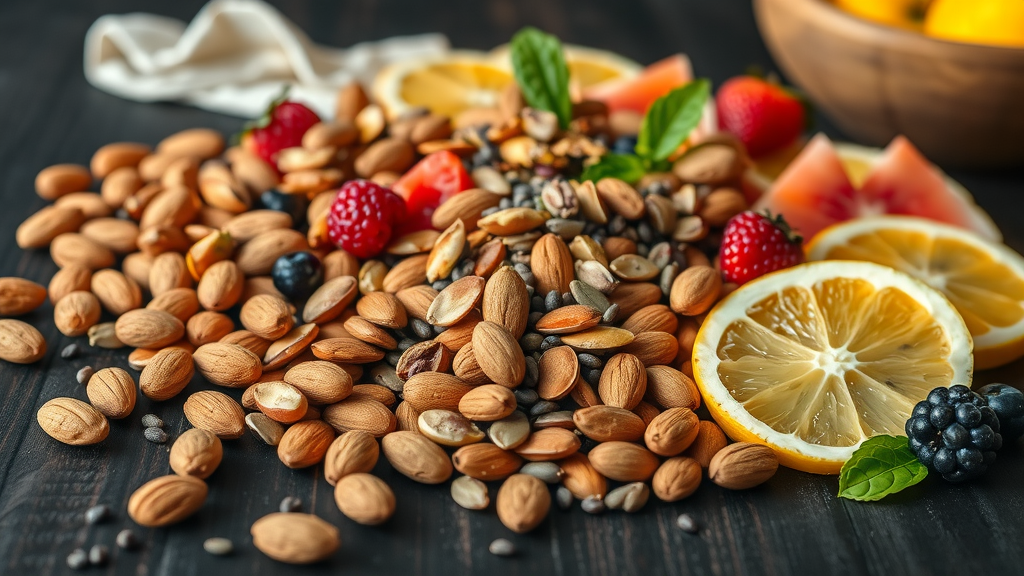In a world where chronic diseases are on the rise, the connection between inflammation and diet is more crucial than ever. This article invites you to explore how what you eat can either fuel or fight inflammation in your body. By mastering this relationship, you can take control of your health, boost your energy, and enhance your overall well-being. Join us on this journey to discover practical strategies that can transform your diet and, ultimately, your life. Your health is worth it!
Opening Thoughts on Inflammation and Diet
Understanding Inflammation: The Body's Response
Inflammation is a natural response of the body to injury or infection. It is a complex biological process that involves the immune system, blood vessels, and various cells. When the body detects harmful stimuli, such as pathogens or damaged cells, it triggers an inflammatory response to eliminate the threat and initiate healing. However, chronic inflammation can lead to various health issues, including heart disease, diabetes, and autoimmune disorders. Understanding this process is essential for recognizing how inflammation and diet are interconnected.
The Role of Diet in Inflammation
Your diet plays a significant role in modulating inflammation. Certain foods can promote inflammation, while others can help reduce it. Diets high in processed foods, sugars, and unhealthy fats can exacerbate inflammatory responses, while a diet rich in whole foods, fruits, vegetables, and healthy fats can combat inflammation. By making informed dietary choices, you can influence your body's inflammatory processes and improve your overall health.
What You'll Learn
Key Concepts of Inflammation and Diet
This article will delve into the key concepts surrounding inflammation and diet, including the types of foods that contribute to inflammation and those that help mitigate it. You'll gain insights into how your dietary choices can impact your health and well-being.
Practical Strategies for an Anti-Inflammatory Diet
We will provide practical strategies for adopting an anti-inflammatory diet, including meal planning tips, food swaps, and recipes that can help you reduce inflammation and promote better health.
The 10 Worst Inflammatory Foods
Identifying Common Culprits
Understanding which foods contribute to inflammation is crucial for making healthier choices. Here are ten common inflammatory foods to avoid:
- Processed meats (e.g., hot dogs, bacon)
- Refined carbohydrates (e.g., white bread, pastries)
- Added sugars (e.g., soda, candy)
- Trans fats (e.g., margarine, fried foods)
- Excessive alcohol
- Processed snack foods (e.g., chips, crackers)
- High-fat dairy products
- Red meat
- Artificial additives and preservatives
- High-sodium foods
How These Foods Affect Your Health
Consuming these inflammatory foods can lead to various health issues, including increased risk of chronic diseases, weight gain, and digestive problems. By eliminating or reducing these foods from your diet, you can significantly lower your inflammation levels and improve your overall health.
The 5 Classic Signs of Inflammation
Recognizing Symptoms in Your Body
Inflammation can manifest in various ways. Here are five classic signs to watch for:
- Redness and swelling in affected areas
- Pain or tenderness
- Heat in the inflamed area
- Loss of function or mobility
- Fatigue or malaise
When to Seek Medical Advice
If you experience persistent inflammation or any of the above symptoms, it is essential to consult a healthcare professional. Chronic inflammation can lead to serious health complications, and early intervention is crucial for effective management.
Breaking Bad Habits: The #1 Habit to Change
Understanding the Impact of Lifestyle Choices
One of the most significant contributors to inflammation is poor lifestyle choices, including a sedentary lifestyle, smoking, and excessive alcohol consumption. Recognizing and addressing these habits is vital for reducing inflammation and improving overall health.
Steps to Eliminate Inflammatory Triggers
To combat inflammation, consider the following steps:
- Incorporate regular physical activity into your routine.
- Quit smoking and limit alcohol intake.
- Focus on a balanced diet rich in anti-inflammatory foods.
- Manage stress through mindfulness and relaxation techniques.
- Get adequate sleep to support your body's healing processes.
Fastest Ways to Reduce Inflammation
Immediate Dietary Changes
To quickly reduce inflammation, consider making the following dietary changes:
- Increase your intake of omega-3 fatty acids found in fatty fish like salmon and flaxseed.
- Incorporate more fruits and vegetables, particularly leafy greens and berries.
- Use healthy fats, such as olive oil, instead of unhealthy fats.
- Limit processed foods and added sugars.
Lifestyle Adjustments for Long-Term Benefits
In addition to dietary changes, adopting a healthier lifestyle can provide long-term benefits for reducing inflammation. Regular exercise, stress management, and adequate sleep are essential components of an anti-inflammatory lifestyle.
Tables
Comparison of Inflammatory vs. Anti-Inflammatory Foods
| Inflammatory Foods | Anti-Inflammatory Foods |
|---|---|
| Processed meats | Fatty fish (e.g., salmon) |
| Refined carbohydrates | Whole grains (e.g., brown rice) |
| Added sugars | Fruits and vegetables |
| Trans fats | Olive oil |
| High-fat dairy | Nuts and seeds |
Quotes
“Let food be thy medicine and medicine be thy food.” - Hippocrates
Lists
Top 5 Anti-Inflammatory Foods
- Fatty fish (e.g., salmon, mackerel)
- Leafy greens (e.g., spinach, kale)
- Berries (e.g., blueberries, strawberries)
- Nuts (e.g., walnuts, almonds)
- Olive oil
FAQs
What are the 10 worst inflammatory foods?
The ten worst inflammatory foods include processed meats, refined carbohydrates, added sugars, trans fats, excessive alcohol, processed snack foods, high-fat dairy products, red meat, artificial additives, and high-sodium foods.
What are the 5 classic signs of inflammation?
The five classic signs of inflammation are redness, swelling, pain, heat, and loss of function.
What is the #1 habit you should break if you have inflammation?
The #1 habit to break is a sedentary lifestyle, as regular physical activity is crucial for reducing inflammation.
What is the fastest way to reduce inflammation in the body?
The fastest way to reduce inflammation is to make immediate dietary changes, such as increasing omega-3 fatty acids and reducing processed foods and added sugars.
Key Takeaways
Summarizing the Connection Between Inflammation and Diet
Understanding the link between inflammation and diet is essential for maintaining good health. By avoiding inflammatory foods and embracing an anti-inflammatory diet, you can significantly improve your well-being and reduce the risk of chronic diseases.
Conclusion
Empowering Your Health Through Dietary Choices
In conclusion, the relationship between inflammation and diet is profound. By making conscious dietary choices and adopting a healthier lifestyle, you can combat inflammation and enhance your overall health. Empower yourself with knowledge and take charge of your health today!
Call to Action
Ready to take the next step? Start by evaluating your current diet and making small changes that can lead to significant improvements in your health. Remember, your health is in your hands!





 Add Row
Add Row  Add
Add 



Write A Comment